An Ugly Law Of Compromise To Satisfy Southern Slaveholders
The Fugitive Slave Act of 1850 meant that if you were an escaping slave or a slave who had escaped to a free Northern state, then you could be hunted down by slaveowners or paid slavecatchers, and returned to slavery in the South. The law required local governments in the free Northern states to cooperate with and not prevent, the efforts of the slaveowners and slavecatchers. If you were a fugitive from slavery, it did not matter how long you had lived in Northern freedom, you could be legally pursued, tracked down, captured, and returned to slavery.
Under the Fugitive Slave Law, if you were a white or free black person and you aided a runaway escaped slave, perhaps by providing food, clothing, care, or shelter, then you were guilty of a federal crime and could be given a heavy fine of $1000 and imprisonment of six months. Citizens had to cooperate with the Fugitive Slave Law. People were required: “to aid and assist in the prompt and efficient execution of this law, whenever their services may be required.”
Note: The names “Fugitive Slave Act” and “Fugitive Slave Law” are interchangeable.
An office of federal commissioners was created by the law and the commissioners determined if a black person captured by slaveowners or slavecatchers was in fact, a runaway slave. These commissioners acted without regard or constraint of state and local laws. By the Fugitive Slave Law there was no trial by jury or the right to habeas corpus for captured runaways. A rigged bounty system almost assured that you would be determined to be a runaway slave because the commissioners were paid $10 for each slave returned to slavery, but only $5 if they determined you to not be runaway slave. Both runaways and freed slaves were returned to slavery by the Fugitive Slave Act of 1850, sometimes even entire free black families were said to be runaways by the slavecatchers and commissioners. Blacks who had been born free had little or no proof of their right to freedom and were accused of being runaways, they would find themselves taken South to toil as slaves. James Phillips was a free black man in Harrisburg, Pennsylvania where he lived and worked for fourteen years, but by the Fugitive Slave Law he was arrested in May, 1852. It was nothing but kidnapping.
Frederick Douglass Regarding The Fugitive Slave Law
“The only way to make the Fugitive Slave Law a dead letter is to make half a dozen or more dead kidnappers. A half dozen more dead kidnappers carried down South would cool the ardor of the Southern gentlemen, and keep their rapacity in check… A black man may be carried away without any reference to a jury. It is only necessary to claim him, and that some villain should swear to his identity. There is more protection there for a horse, for a donkey, or anything, rather than a colored man–who is, therefore, justified in the eye of God in maintaining his right with arm.”
How The Fugitive Slave Law Came About- The Compromise of 1850
The Mexican War lasted sixteen months (1846-1848) and under the Treaty of Guadalupe Hidalgo, a vast amount of territory was added to the United States. This territory would eventually become the states of California, Nevada, and Utah, most of the state of Arizona, and parts of the states of Colorado, Wyoming, and New Mexico. Besides adding new territory to the United States, the Mexican War also added new political debate and conflict within the country. Would the new territory be slave or free?
Matters came to a boil when California was admitted to the Union as a state in 1850. Even then, California had a huge population and if it became a free state, then the political representative balance between North and South would be upset. The North already held an advantage in the House, and if California became free then it meant the North would also have a Senate majority. This launched a contentious and explosive political debate. California’s status, and also the rest of the newly acquired territory, of being made free or slave would shift political power dramatically in a country already strongly divided over slavery.
Senator Henry Clay was a Whig from Kentucky and he was an experienced politician whose career had included time as congressman, senator, secretary of state, and as a presidential candidate. Clay had the art of compromise in his bones, earlier when the United States had faced severe division between the political parties of North and South Henry Clay had devised compromises in the forms of the Missouri Compromise and the Compromise Tariff. Clay’s efforts of compromise worked and disunion was prevented with these measures.In 1850, Henry Clay was seventy-three-years old but the white-haired Kentucky senator had another compromise up his sleeve. Clay drafted a compromise to ward off the threat of disunion between North and South brought about by whether or not California and the other lands acquired from Mexico would be free or slave. Henry Clay’s Compromise of 1850 at first failed to pass, but then Democrat Stephen Douglass of Illinois by Clay’s guidance arranged the Compromise of 1850 into five smaller acts, and then it narrowly passed.
The Compromise of 1850 was successful in avoiding secession and a Civil War… until 1860. However, the Fugitive Slave Law of the Compromise of 1850 left the country with an ugly law that only the bloodshed of a Civil War would remove.
The Compromise of 1850
- California would be a free state. (pro-free)
- Slave trade (But not slavery!) would be abolished in the District of Columbia. (pro-free)
- The citizens of Utah and New Mexico would decide by popular sovereignty whether their territories were to have slavery. (pro-slave)
- Texas (a slave state) would not further expand at the expense of New Mexico territory, and the Federal government would award $10 million to Texas to settle claims of its national debt. (pro-slave)
- The Fugitive Slave Law was created. (pro-slave)
Steal Away – Reverend Pearly Brown
The Fugitive Slave Act 1850
Section 1
Be it enacted by the Senate and House of Representatives of the United States of America in Congress assembled, That the persons who have been, or may hereafter be, appointed commissioners, in virtue of any act of Congress, by the Circuit Courts of the United States, and Who, in consequence of such appointment, are authorized to exercise the powers that any justice of the peace, or other magistrate of any of the United States, may exercise in respect to offenders for any crime or offense against the United States, by arresting, imprisoning, or bailing the same under and by the virtue of the thirty-third section of the act of the twenty-fourth of September seventeen hundred and eighty-nine, entitled “An Act to establish the judicial courts of the United States” shall be, and are hereby, authorized and required to exercise and discharge all the powers and duties conferred by this act.
Section 2
And be it further enacted, That the Superior Court of each organized Territory of the United States shall have the same power to appoint commissioners to take acknowledgments of bail and affidavits, and to take depositions of witnesses in civil causes, which is now possessed by the Circuit Court of the United States; and all commissioners who shall hereafter be appointed for such purposes by the Superior Court of any organized Territory of the United States, shall possess all the powers, and exercise all the duties, conferred by law upon the commissioners appointed by the Circuit Courts of the United States for similar purposes, and shall moreover exercise and discharge all the powers and duties conferred by this act.
Section 3
And be it further enacted, That the Circuit Courts of the United States shall from time to time enlarge the number of the commissioners, with a view to afford reasonable facilities to reclaim fugitives from labor, and to the prompt discharge of the duties imposed by this act.Section 4
And be it further enacted, That the commissioners above named shall have concurrent jurisdiction with the judges of the Circuit and District Courts of the United States, in their respective circuits and districts within the several States, and the judges of the Superior Courts of the Territories, severally and collectively, in term-time and vacation; shall grant certificates to such claimants, upon satisfactory proof being made, with authority to take and remove such fugitives from service or labor, under the restrictions herein contained, to the State or Territory from which such persons may have escaped or fled.
Section 5
And be it further enacted, That it shall be the duty of all marshals and deputy marshals to obey and execute all warrants and precepts issued under the provisions of this act, when to them directed; and should any marshal or deputy marshal refuse to receive such warrant, or other process, when tendered, or to use all proper means diligently to execute the same, he shall, on conviction thereof, be fined in the sum of one thousand dollars, to the use of such claimant, on the motion of such claimant, by the Circuit or District Court for the district of such marshal; and after arrest of such fugitive, by such marshal or his deputy, or whilst at any time in his custody under the provisions of this act, should such fugitive escape, whether with or without the assent of such marshal or his deputy, such marshal shall be liable, on his official bond, to be prosecuted for the benefit of such claimant, for the full value of the service or labor of said fugitive in the State, Territory, or District whence he escaped: and the better to enable the said commissioners, when thus appointed, to execute their duties faithfully and efficiently, in conformity with the requirements of the Constitution of the United States and of this act, they are hereby authorized and empowered, within their counties respectively, to appoint, in writing under their hands, any one or more suitable persons, from time to time, to execute all such warrants and other process as may be issued by them in the lawful performance of their respective duties; with authority to such commissioners, or the persons to be appointed by them, to execute process as aforesaid, to summon and call to their aid the bystanders, or posse comitatus of the proper county, when necessary to ensure a faithful observance of the clause of the Constitution referred to, in conformity with the provisions of this act; and all good citizens are hereby commanded to aid and assist in the prompt and efficient execution of this law, whenever their services may be required, as aforesaid, for that purpose; and said warrants shall run, and be executed by said officers, any where in the State within which they are issued.
Section 6
And be it further enacted, That when a person held to service or labor in any State or Territory of the United States, has heretofore or shall hereafter escape into another State or Territory of the United States, the person or persons to whom such service or labor may be due, or his, her, or their agent or attorney, duly authorized, by power of attorney, in writing, acknowledged and certified under the seal of some legal officer or court of the State or Territory in which the same may be executed, may pursue and reclaim such fugitive person, either by procuring a warrant from some one of the courts, judges, or commissioners aforesaid, of the proper circuit, district, or county, for the apprehension of such fugitive from service or labor, or by seizing and arresting such fugitive, where the same can be done without process, and by taking, or causing such person to be taken, forthwith before such court, judge, or commissioner, whose duty it shall be to hear and determine the case of such claimant in a summary manner; and upon satisfactory proof being made, by deposition or affidavit, in writing, to be taken and certified by such court, judge, or commissioner, or by other satisfactory testimony, duly taken and certified by some court, magistrate, justice of the peace, or other legal officer authorized to administer an oath and take depositions under the laws of the State or Territory from which such person owing service or labor may have escaped, with a certificate of such magistracy or other authority, as aforesaid, with the seal of the proper court or officer thereto attached, which seal shall be sufficient to establish the competency of the proof, and with proof, also by affidavit, of the identity of the person whose service or labor is claimed to be due as aforesaid, that the person so arrested does in fact owe service or labor to the person or persons claiming him or her, in the State or Territory from which such fugitive may have escaped as aforesaid, and that said person escaped, to make out and deliver to such claimant, his or her agent or attorney, a certificate setting forth the substantial facts as to the service or labor due from such fugitive to the claimant, and of his or her escape from the State or Territory in which he or she was arrested, with authority to such claimant, or his or her agent or attorney, to use such reasonable force and restraint as may be necessary, under the circumstances of the case, to take and remove such fugitive person back to the State or Territory whence he or she may have escaped as aforesaid. In no trial or hearing under this act shall the testimony of such alleged fugitive be admitted in evidence; and the certificates in this and the first [fourth] section mentioned, shall be conclusive of the right of the person or persons in whose favor granted, to remove such fugitive to the State or Territory from which he escaped, and shall prevent all molestation of such person or persons by any process issued by any court, judge, magistrate, or other person whomsoever.
Section 7
And be it further enacted, That any person who shall knowingly and willingly obstruct, hinder, or prevent such claimant, his agent or attorney, or any person or persons lawfully assisting him, her, or them, from arresting such a fugitive from service or labor, either with or without process as aforesaid, or shall rescue, or attempt to rescue, such fugitive from service or labor, from the custody of such claimant, his or her agent or attorney, or other person or persons lawfully assisting as aforesaid, when so arrested, pursuant to the authority herein given and declared; or shall aid, abet, or assist such person so owing service or labor as aforesaid, directly or indirectly, to escape from such claimant, his agent or attorney, or other person or persons legally authorized as aforesaid; or shall harbor or conceal such fugitive, so as to prevent the discovery and arrest of such person, after notice or knowledge of the fact that such person was a fugitive from service or labor as aforesaid, shall, for either of said offences, be subject to a fine not exceeding one thousand dollars, and imprisonment not exceeding six months, by indictment and conviction before the District Court of the United States for the district in which such offence may have been committed, or before the proper court of criminal jurisdiction, if committed within any one of the organized Territories of the United States; and shall moreover forfeit and pay, by way of civil damages to the party injured by such illegal conduct, the sum of one thousand dollars for each fugitive so lost as aforesaid, to be recovered by action of debt, in any of the District or Territorial Courts aforesaid, within whose jurisdiction the said offence may have been committed.
Section 8
And be it further enacted, That the marshals, their deputies, and the clerks of the said District and Territorial Courts, shall be paid, for their services, the like fees as may be allowed for similar services in other cases; and where such services are rendered exclusively in the arrest, custody, and delivery of the fugitive to the claimant, his or her agent or attorney, or where such supposed fugitive may be discharged out of custody for the want of sufficient proof as aforesaid, then such fees are to be paid in whole by such claimant, his or her agent or attorney; and in all cases where the proceedings are before a commissioner, he shall be entitled to a fee of ten dollars in full for his services in each case, upon the delivery of the said certificate to the claimant, his agent or attorney; or a fee of five dollars in cases where the proof shall not, in the opinion of such commissioner, warrant such certificate and delivery, inclusive of all services incident to such arrest and examination, to be paid, in either case, by the claimant, his or her agent or attorney. The person or persons authorized to execute the process to be issued by such commissioner for the arrest and detention of fugitives from service or labor as aforesaid, shall also be entitled to a fee of five dollars each for each person he or they may arrest, and take before any commissioner as aforesaid, at the instance and request of such claimant, with such other fees as may be deemed reasonable by such commissioner for such other additional services as may be necessarily performed by him or them; such as attending at the examination, keeping the fugitive in custody, and providing him with food and lodging during his detention, and until the final determination of such commissioners; and, in general, for performing such other duties as may be required by such claimant, his or her attorney or agent, or commissioner in the premises, such fees to be made up in conformity with the fees usually charged by the officers of the courts of justice within the proper district or county, as near as may be practicable, and paid by such claimants, their agents or attorneys, whether such supposed fugitives from service or labor be ordered to be delivered to such claimant by the final determination of such commissioner or not.
Section 9
And be it further enacted, That, upon affidavit made by the claimant of such fugitive, his agent or attorney, after such certificate has been issued, that he has reason to apprehend that such fugitive will he rescued by force from his or their possession before he can be taken beyond the limits of the State in which the arrest is made, it shall be the duty of the officer making the arrest to retain such fugitive in his custody, and to remove him to the State whence he fled, and there to deliver him to said claimant,
his agent, or attorney. And to this end, the officer aforesaid is hereby authorized and required to employ so many persons as he may deem necessary to overcome such force, and to retain them in his service so long as circumstances may require. The said officer and his assistants, while so employed, to receive the same compensation, and to be allowed the same expenses, as are now allowed by law for transportation of criminals, to be certified by the judge of the district within which the arrest is made, and paid out of the treasury of the United States.
Section 10
And be it further enacted, That when any person held to service or labor in any State or Territory, or in the District of Columbia, shall escape therefrom, the party to whom such service or labor shall be due, his, her, or their agent or attorney, may apply to any court of record therein, or judge thereof in vacation, and make satisfactory proof to such court, or judge in vacation, of the escape aforesaid, and that the person escaping owed service or labor to such party. Whereupon the court shall cause a record to be made of the matters so proved, and also a general description of the person so escaping, with such convenient certainty as may be; and a transcript of such record, authenticated by the attestation of the clerk and of the seal of the said court, being produced in any other State, Territory, or district in which the person so escaping may be found, and being exhibited to any judge, commissioner, or other office, authorized by the law of the United States to cause persons escaping from service or labor to be delivered up, shall be held and taken to be full and conclusive evidence of the fact of escape, and that the service or labor of the person escaping is due to the party in such record mentioned. And upon the production by the said party of other and further evidence if necessary, either oral or by affidavit, in addition to what is contained in the said record of the identity of the person escaping, he or she shall be delivered up to the claimant, And the said court, commissioner, judge, or other person authorized by this act to grant certificates to claimants or fugitives, shall, upon the production of the record and other evidences aforesaid, grant to such claimant a certificate of his right to take any such person identified and proved to be owing service or labor as aforesaid, which certificate shall authorize such claimant to seize or arrest and transport such person to the State or Territory from which he escaped: Provided, That nothing herein contained shall be construed as requiring the production of a transcript of such record as evidence as aforesaid. But in its absence the claim shall be heard and determined upon other satisfactory proofs, competent in law.
Approved, September 18, 1850.
Learn Civil War History Podcast Episode Seven: Freedman Jourdon Anderson Writes A Letter To His Old Master
Spotify

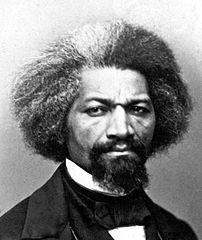
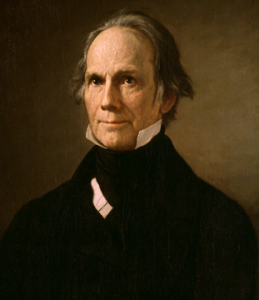
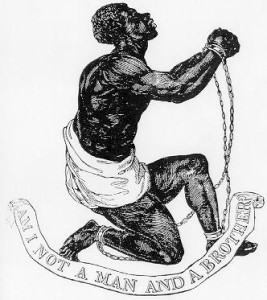
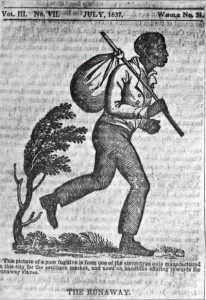
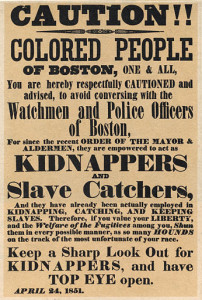

What are some quotes about the fugitive slave acts
A Google search for "fugitive slave act 1850 quotes" will provide you a wealth of information and links.